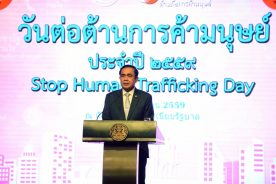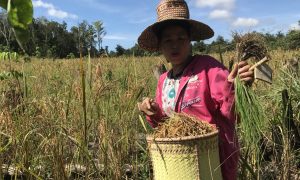“My sister and I have to send all the money back home. We could not make any savings in Thailand. It is getting harder in Myanmar and my mom relies on us for household income. Everything becomes more expensive and market is not function as usual. If Tatmadaw [Myanmar military] remains in the power, we are going to suffer.” –Interview with a female Myanmar migrant in Thailand after the Myanmar coup d’état on February 1, 2021.
Myanmar’s democratic backsliding threatens 4.25 million Myanmar migrants—the majority of them in neighbouring Thailand—with an unforeseeable future. As their travel documents expire, they risk becoming undocumented overseas and excluded from legal protections by shortcomings in both Myanmar and Thai migration policies.
Migrant vulnerabilities back home
Myanmar workers in Thailand have been neglected by the previous junta government over the past three decades. This changed with Aung San Su Kyi’s first visit to migrant communities in Thailand in 2012, where she promised to never abandon Burmese abroad. Myanmar workers had hoped that the civilian government would recognize their existence and improve their livelihoods in Thailand and Myanmar.
During the Myanmar Election observation in 2015, I encountered migrant workers who returned to their hometown to vote. Political remittances played a significant role in driving the views of Myanmar migrants. A worker and voter in Karen State shared that “I have to spend my savings for my journey back to my village so I can cast my vote for NLD [National League for Democracy] party. I believe that the military regime caused me to leave home in first place. Being migrant overseas is not easy life. My home in Myanmar is built on remittance money. We have seen Thailand became more developed while Myanmar is still trapped in the time capsule. Myanmar had not changed in the past 30 years. I have strong drives to take action for change.”
Prior the 2021 Coup, Myanmar migrants and their families in Thailand were confident that the elected Myanmar government would be able to boost the domestic economy. This presented them with the opportunity to escape hardship and discrimination in Thailand and set up business ventures upon their return. However, all their dreams were disrupted unexpectedly when the military junta seized power. A UN report indicates that the Myanmar economy would revert to the same dire situation as 2005.
Myanmar migrants in Thailand were immediately affected by coup. Their reliance on online social media to get updates on the political situation was disrupted by cuts to the internet and communications. Migrants in Thailand are filled with anxiety and concerns over violence and safety of their family members. As of May 25, more than 800 people were killed by the Myanmar military crackdown, 4,301 political prisoners arrested, and ethnic minorities attacked by airstrikes in ethnic controlled areas.
Furthermore, the military government is unlikely to turn to policymaking in migration management any time soon. With its weak domestic legitimacy, the junta will prioritise consolidating its own power first. This will not come easily with resistance from Myanmar citizens and National Unity Government (NUG). The same can be said about the NUG, which will mostly be pre-occupied with delegitimizing the junta and obtaining international recognition. Further, the NUG is not in the position to facilitate any international migration or negotiate with any migration-receiving countries such as Thailand.
Thailand must end trafficking of all migrant workers
Slavery in seafood industry just one part of a broader problem.
There are estimated 500,000 Myanmar workers whose passport documents will expire by July 2021. Migrants have to renew their documents with the Myanmar embassy but have been unable to reach embassy officials. In March 2021, the Myanmar and Thai governments agreed to open three centers to issue identity documents so workers can legally stay in Thailand. But this plan has been delayed without any public acknowledgment. Many Myanmar workers are also interpreting this action as a lack of accountability and responsibility on the part of the Myanmar government in protecting its own citizens.
Migrant vulnerabilities overseas
Thailand employs as many as 3 million Myanmar migrant workers in fishery, construction, agriculture domestic work, services, hospitality and other low paid jobs. In addition, there are 91,818 refugees from Myanmar living in nine camps along the Thai-Myanmar border. There are no official statistics to verify the actual number of undocumented migrants in Thailand.
In the aftermath of the Myanmar coup, Myanmar migrant workers in Thailand faced challenges sending remittances. UN Migration estimated US$2.8 billion were sent to Myanmar annually from overseas Myanmar in Thailand, Malaysia, China and other countries through formal channels, and additional US$10 billion sent through informal channels. Both banks and formal channels have either shut down or reduced their operation hours. Alternatively, migrants have resorted to informal channels. Yet, my interview with workers also reveal that informal remittance brokers are under surveillance by the army and are worried money may be taken away or never make it to their families, who need remittances to cover daily expenses, including caring for the children of migrants, who have been left behind at home.
Moreover, with COVID-19 closing all the legal migration channels since last year, migrants increasingly rely on smugglers for border crossing. Thailand’s Immigrant Act classifies irregular migrants, refugees and asylum seekers as “illegal immigrants,” and thus subject to immigration offences. In 2020, at least 60,000 Myanmar workers applied to legally enter Thailand. However, the International Organisation for Migration which conducts mobility monitoring states that 1000 Myanmar nationals attempted to enter Thailand without authorisation. Each migrant reportedly pays brokers up to 14,000-16,000 baht (US$ 450-550) to be transported into Thailand for one trip. The migration journey thus puts migrants at risk of being exploited by smugglers and traffickers at any time.
Thai authorities also intensified border enforcement in attempting to crack down on migrant smuggling in the name of COVID-19 containment. The Thai government claimed that since January 2021, officials arrested 15,378 smuggled migrants in total and of which were 6,072 Myanmar nationals. Migrant can also be subject to extortion by corrupt officials. Upon arrest, there is no screening mechanism to profile smuggled migrants but migrants can be held for prolonged detention prior to deportation. Furthermore, in fear of being deported due to expired documents, migrants have started bribing local authorities so they can receive unlawful permits to stay in Thailand. The wife of migrant construction worker and a mother of 4 children told me during an interview on 5 April 2021 that they had to pay a village chief US$10 a month.
Migration through irregular channels is anticipated to increase, driven by the Myanmar military’s violent suppression of political protesters and opposition and military warfare in the area controlled by ethnic armed groups. The Thai military government has also pushed back asylum seekers from Myanmar, thus violating the international principle of non-refoulement in which no one shall be returned to a place of harm.
One way the Thai government addresses migrants’ lack of legal status is through a registration program. It was first implemented along the border in 1992 and extended nationwide in 2001. By registering with authorities, migrants are granted a temporary stay and right to employment in Thailand. However, the pandemic has disrupted the regularisation of migration status and increased number of undocumented workers. There were estimated 600,000 migrant workers who lost their legal status between October 2019 and October 2020.
Migrant workers became undocumented due to many reasons, such as being dismissed from their job, failing to submit documents required for registration and having insufficient funds to pay for the documentation renewal and administrative fees. Many also could not find new employers within fifteen days as stipulated by work permit conditions, hence their work permit was automatically cancelled. While trying to stay in Thailand, undocumented migrants are also stigmatised by local perceptions that they crossed the border illegally, and in doing so, caused new COVID-19 outbreaks.
As a result of these negative perceptions, Thailand’s current policy is largely focused on arresting undocumented workers. The continued suppression of undocumented migrants causes fear and drive them into an even more marginalised and vulnerable position.
Migrant protection during political and heath crises
Both Thailand and Myanmar governments have a political will to promote the rights of migrants and invested significantly in domestic legal reforms. But the lack of coherent migration policies to facilitate migrants’ journeys and employment during the political and pandemic crises risks reversing progress in migrant protection.
Three months after seizing power, Myanmar’s military government is facing challenges in gaining trust from its people. State functions and capacity that would otherwise attend to the plight of migrants have collapsed due to nationwide strike in the public sector. Thus, Myanmar’s return to democracy is crucial and may offer hope for migrants again.
For the Thai government, it is crucial to recognize that migrant workers make a significant contribution to the Thai economy, approximately $1.8 billion or 1.25 percent of national GDP. The government should therefore shift its migration management approach from criminalizing undocumented migrants to ensuring a comprehensive migration policy developed inclusively with relevant stakeholders. A change in official mindset would be beneficial as it will address both the incompetency of origin countries and economic recovery post-pandemic.
 Facebook
Facebook  Twitter
Twitter  Soundcloud
Soundcloud  Youtube
Youtube  Rss
Rss 



